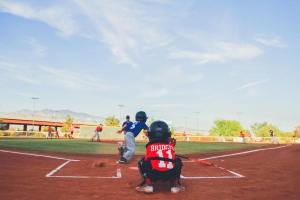Forty years ago, after graduating high school, I worked diligently at playing slow-pitch softball. It was something I wanted and wasn’t afraid to do. Slow-pitch softball was my sub-culture of choice. Some people like to ride motorcycles, some collect Hummel figurines, but I enjoyed taking the boring game of baseball and dummying it down by pitching underhand lobs.
That’s not to say it wasn’t entertaining. If polo is the sport of kings, slow-pitch softball is the sport of beer-drinking guys who don’t want to run fast or run far. In fact, the best softball players hit home runs and jog like diva tenors walking off stage while the opera nerds applaud.
I wanted that adulation, but I wasn’t even on a team. So I pestered my boss at the recreation center, who managed a team, to give me a spot on the roster.
My main problem was lack of size. My next problem was lack of strength. Oh, and I really didn’t know how to hit a home run ball. There’s a trick to it, requiring practice to get the explosive energy needed. But I thought I could figure it out, practiced batting, and lifted weights to try to be strong enough to hit ’em out of the park. But that wasn’t all I did that summer after high school.
Forty years ago was also when I wrote my first short story. Over the course of a few summer afternoons, I sat at a Royal typewriter in our converted-attic bedroom. A Vornado fan sucked the heat out as best it could, but it was a miserable place to spend an afternoon.
Still, I hacked out 700 words in the form of a story. I had no instruction in the art form. My examples and inspiration were all from stories read during high school English. There were also plenty of stories kicked around at family gatherings, and that’s how I approached the problem: tell it like you’re telling someone at a party. Full disclosure: the story I wrote was awful.
I wanted to be a writer as much as I wanted to be a home run-hitting softball player. These interests are not mutually exclusive but they don’t intermingle in conversation. For example, after a softball game, we’d go to a bar to drink and celebrate, win or lose, and talk “softball” proudly. In between the PBRs and Kamikazes, you can’t blurt out how much you loved Chekhov’s story The Woman with the Little Dog, or that you found Faulkner’s story A Rose for Mary weird.
Talking about writing embarrassed me—I had never met a writer, had no idea what it meant, really, to be a writer, and it wasn’t a thing anyone I knew wanted to do. Whereas I had grown up around softball, and already had dozens of anecdotes about greats like Bruce Mead, Mighty Joe Young, and Mike Macenko, and I was mesmerized by the oft-told story about Pyramid Cafe, a local team that won the national championship in 1975.
Late in June, my boss put me and a few of my friends on his team. I had played baseball in high school, so I wasn’t bad, but I wanted to hit home runs. At least I was in the place I needed to be.
I also wanted to hit a home run with my writing. I had no idea how much I had to learn. I didn’t even know where to go to learn it. But I had written that one story.
I showed that first, tentative story to my brother, despite the fact that he knew even less than I did about short stories. Hell, he had trouble spelling. But he read the story. After, he shrugged and said, “Okay. What’re you going to do with it.” I had no idea what to do with that story, how to make it better, or what to do next.
Softball was a little more obvious on what to do: get stronger, practice the swing, keep showing up to get in the games. That really became my focus because the feedback loop of playing, cheering fans, and drinking together afterwards was addictive.
One night, a strong wind whipped up and blew straight out to left field. There were four guys on the team that could hit home runs: the Batcha brothers, Ricky, Billy and Buddha, and Kenny P. This night, with the wind at their back, they each blasted one over the fence.
When I took my turn at the plate, I swung too hard, threw off my timing, and dribbled a grounder for an easy out.
My next at-bat, I got hold of the pitch and sent the ball deep, but not far enough, bouncing off the fence for a double. It was a good hit but still I shook my head in disgust. Even with the wind at my back, I couldn’t do it.
I got one more at bat. Perhaps it was the cooler air as the night wore on, or maybe the wind gusted a bit more, but I hit it over the fence for a home run. As I trotted around the bases, I thought maybe this would be the first of many home runs, that, despite my relatively small frame, I could be a home run hitter. I could be one of the greats.
My teammates teased me because the home run was wind-assisted. Billy Batcha pulled me aside. “Don’t listen to those assholes,” he said. “If you can’t hit a home run tonight, you’ll never hit one. But you did. You hit a home run, so the hell with those guys.”
I suppose there is something similar for writing fiction, that maybe if one of your parents is a writer, you have a chance to learn how to write short stories and novels the way my father taught me to swing a bat or throw a ball. Maybe if you manage to study writing in college, rather than a trade, you’ll meet like-minded people who show you the way it’s done. They teach you the practice of drafting, shaping, and revising stories. They show you how to write a query and a cover letter. They create that feedback loop of writing, submitting and publishing that makes it fun. There might even be the equivalent of a gust of wind at your back that helps you along, getting a story in a respected journal, or maybe even a book deal.
What I’ve learned these forty years is it takes a tremendous amount of work to become a writer, as much work as with anything else I’ve tried in my life. Just as there are tens of thousands of skilled amateur ball players in this country, there are tens of thousands of skilled amateur writers. We all want to hit the home run.
If you’ve seen Field of Dreams, you may recall the scene in which the doctor, magically transformed into a young man, makes a good baseball play on the field playing against the greatest legends of the game, but then must step away, returning to his older, doctor self, to save the life of the kid choking on a hot dog. And that’s it for the good doctor. He saves the kid, but he can’t go back to playing baseball. His dream is over.
I played softball sporadically over the years, but as my job and family life pulled me in various directions, I never caught on with another team. Eventually, I stopped thinking about it and the dream faded.
That one home run I hit was the only one ever for me.
Meanwhile, at My Writing Desk…
I placed another piece with Greener Pastures. This one is about our return to office under the shadow of a pandemic. Basically, I’m not ready to go back yet….still, I hope it makes you laugh.
Maybe You’d Like
This month, I’m teaming up with mystery writers. There are a lot of cozy-looking book on this list, so if that’s your thing, give them a look!
Next Picayune
Next time I’ll be back with another story and more writing news to share. Thanks for reading the Mickey Picayune.
All the best,
–mickey








